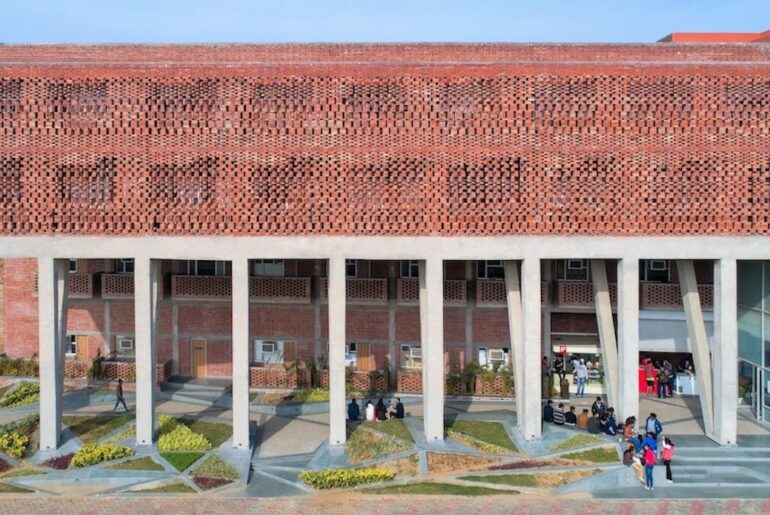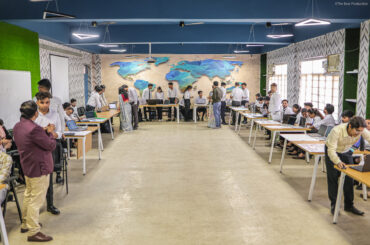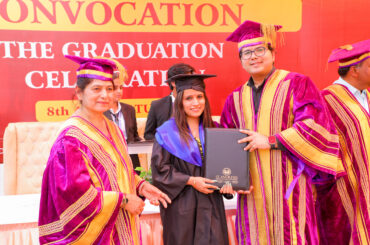Best Engineering Colleges
When selecting the best engineering colleges, prospective students should consider several critical factors that contribute to the excellence of an institution.
These include the quality of faculty, state-of-the-art facilities, and strong industry partnerships that provide valuable internship and employment opportunities.
Accreditation from recognized bodies also plays a significant role in ensuring the quality of the curriculum and its relevance to current industry standards.
Alumni networks and student support services are equally important, as they contribute to the holistic development of the students and their professional success after graduation. St. Andrews Institute of Technology and Management (SAITM) is emerging as a notable institution among private colleges.
Some of the most opted courses in India and St. Andrews college or different Engineering college or Management colleges are as follows:-
- Btech
- BCA
- Btech CSE
- MTech
- Btech ETCE
- BBA
- MBA
- MCA
- DPharma – St. Andrews College of Pharmacy
- BPharma – St. Andrews College of Pharmacy
- BArch – St. Andrews College of Architecture
Overview of Engineering Course
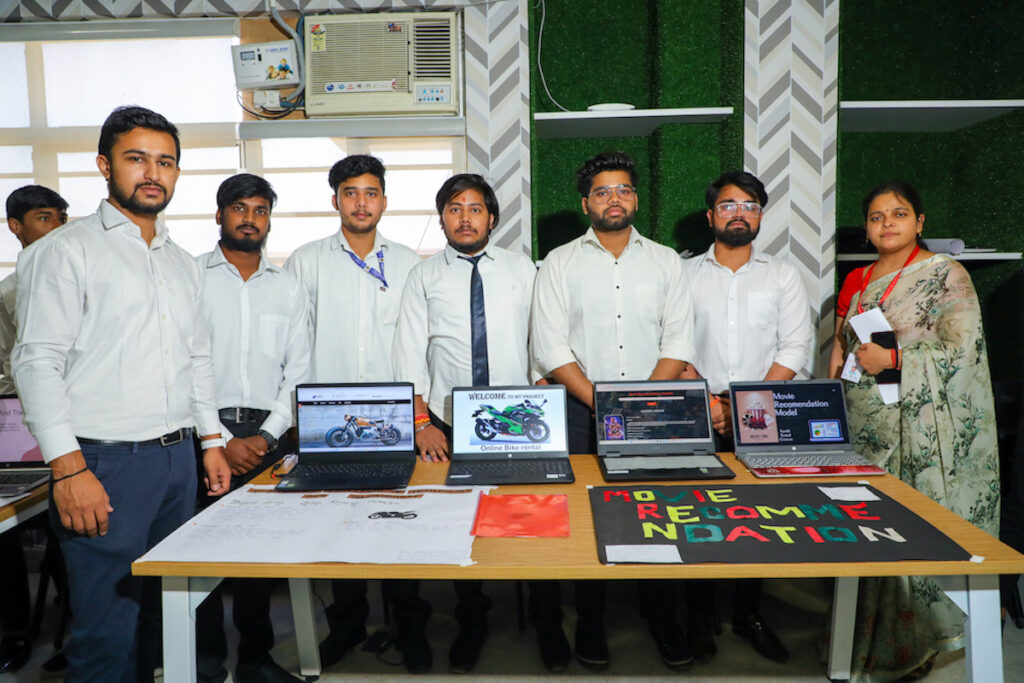
An engineering course is a comprehensive academic program designed to provide students with a robust understanding of mathematical, scientific, and technical principles to solve real-world problems. Typically spanning four years for a bachelor’s degree (B.Tech/B.E.), the course combines theoretical knowledge with practical application through laboratory work, projects, and internships.
Core Subjects
Engineering students study core subjects such as Mathematics, Physics, Chemistry, and specific engineering disciplines like Mechanical, Civil, Electrical, or Computer Science. Advanced courses may include data structures, algorithms, thermodynamics, fluid dynamics, and electronics.
Specializations
Students can choose from various specializations such as Artificial Intelligence, Structural Engineering, Robotics, and Environmental Engineering based on their interests and career goals.
Practical Exposure
Engineering programs emphasize hands-on experience through lab work, workshops, and industrial training. Projects and internships offer real-world problem-solving experience and industry exposure.
Career Opportunities
Graduates can pursue careers in diverse sectors, including IT, manufacturing, construction, and aerospace, or continue with higher studies in specialized fields or management.
Skills Developed
The course fosters problem-solving skills, critical thinking, and technical expertise, preparing students for dynamic and challenging engineering roles.
Duration of Top Engineering Colleges
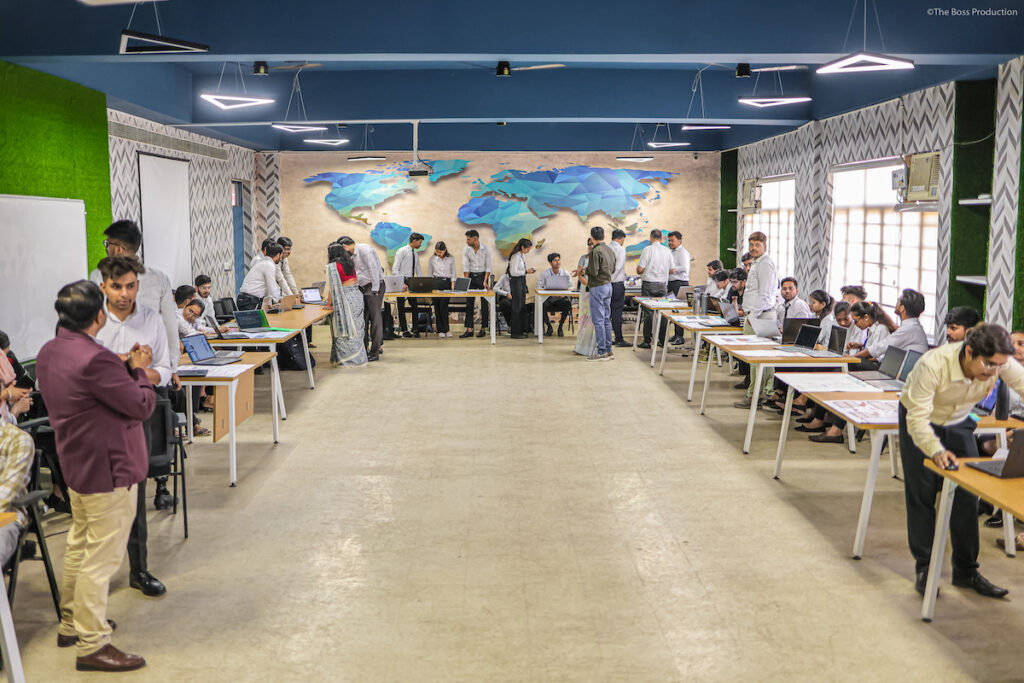
Top engineering colleges in India typically offer a 4-year B.Tech program. The duration includes core engineering courses, electives, and project work. Institutes such as IITs, NITs, and IIITs adhere to a structured curriculum that spans eight semesters. Some colleges may offer integrated programs or specializations extending beyond the standard 4 years. Postgraduate programs like M.Tech usually span 2 years. Notable institutions include IIT Bombay, IIT Delhi, NIT Trichy, and IIIT Hyderabad, all providing comprehensive education designed to meet industry standards and foster innovation.
Scope of Top Engineering Colleges
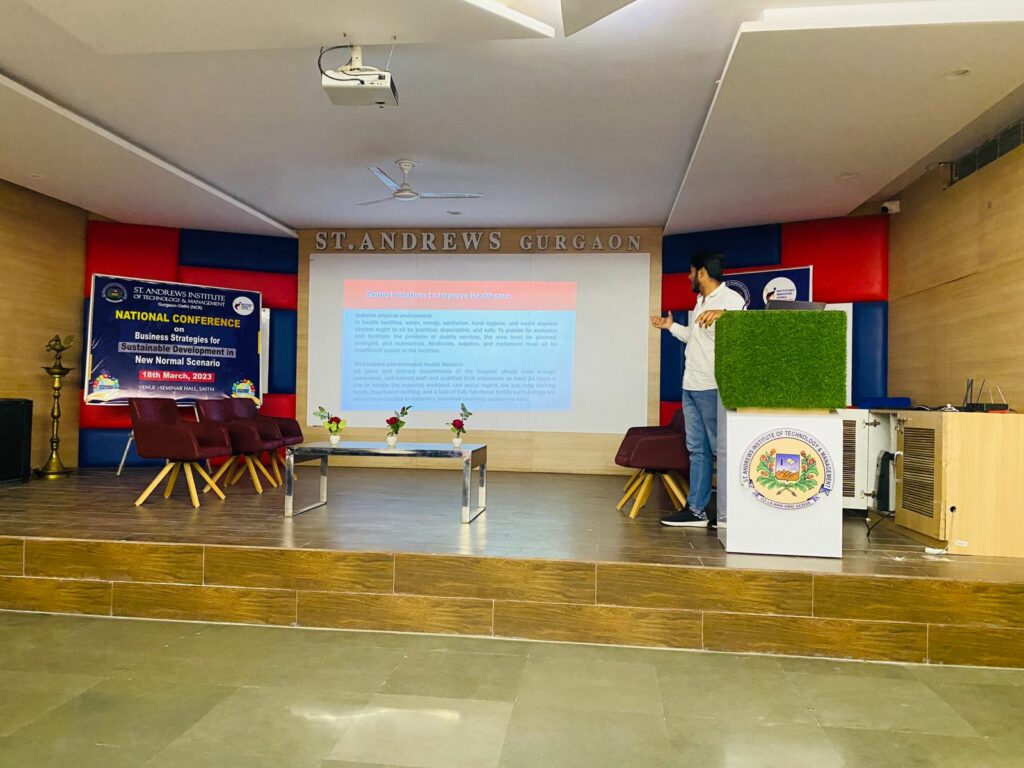
Here’s a brief overview of what these institutions typically offer:
Academic Excellence
- Cutting-edge Curriculum: Up-to-date with the latest industry trends and technological advancements.
- Top Faculty: Renowned professors with significant research and industry experience.
Research Opportunities
- Innovative Projects: Access to state-of-the-art labs and research facilities.
- Collaborations: Partnerships with global universities and industries for research and development.
Industry Connections
- Internships: Strong ties with leading companies providing practical experience.
- Placements: High placement rates with top multinational and national companies.
Global Recognition
- Rankings: High positions in national and international rankings.
- Alumni Network: Successful alumni who are leaders in their fields globally.
Campus Life
- Extracurriculars: Various clubs, societies, and activities enhancing personal development.
- Facilities: Modern infrastructure, including hostels, libraries, and recreational areas.
Skill Development
- Technical Skills: Hands-on training in emerging technologies and engineering practices.
- Soft Skills: Emphasis on communication, leadership, and teamwork.
Entrepreneurship Support
- Incubation Centers: Facilities and mentorship for start-ups and innovation.
- Funding: Opportunities for funding and business development.
Engineering Colleges in India: Admissions
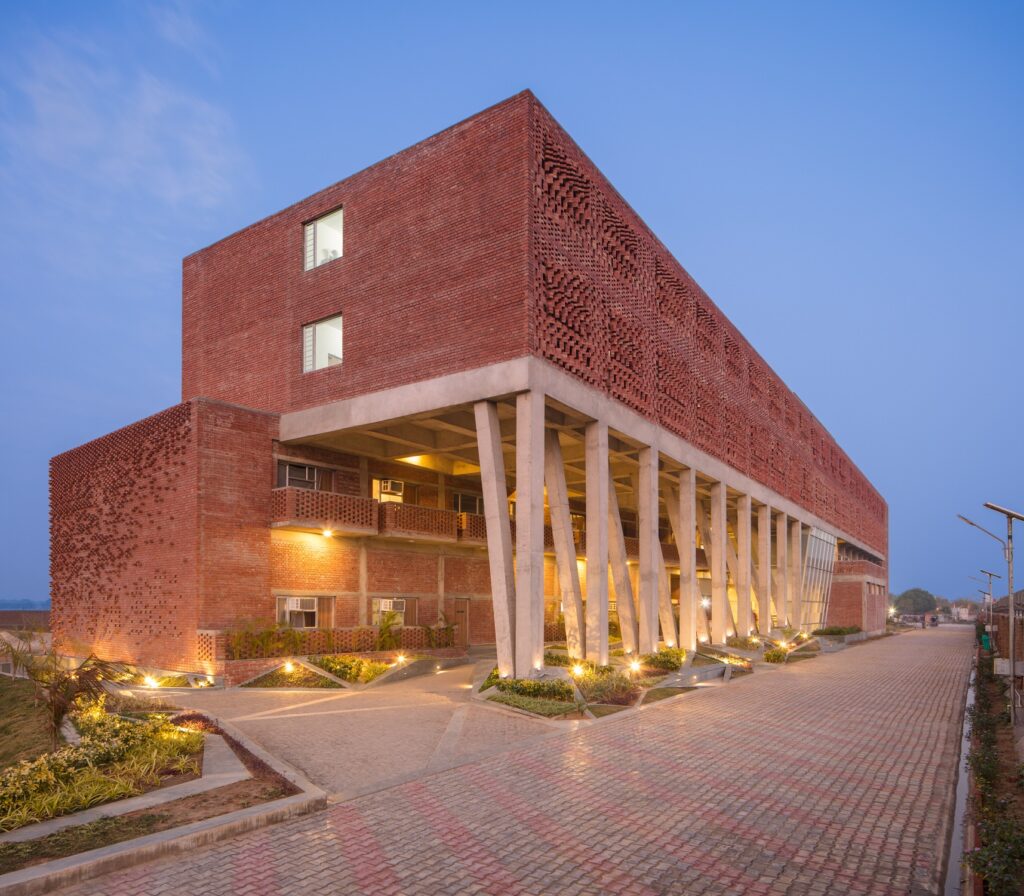
Admissions to engineering colleges in India typically follow these general steps, but details may vary depending on the institution:
Eligibility Criteria
- Educational Qualification: Completion of 10+2 (or equivalent) with Physics, Mathematics, and Chemistry/Biology.
- Minimum Marks: Often, a minimum percentage is required in these subjects (commonly 50% or above).
- Entrance Exams: Many colleges require entrance exams like JEE Main, JEE Advanced, BITSAT, or state-level exams.
Entrance Exams
- JEE Main: Conducted by NTA, it is a gateway for admission to NITs, IIITs, and other centrally funded technical institutions.
- JEE Advanced: For admission to IITs, students need to qualify JEE Main and then appear for JEE Advanced.
- BITSAT: Conducted by BITS Pilani for admission to its campuses.
- State-Level Exams: Such as MHT-CET (Maharashtra), KCET (Karnataka), etc.
Application Process
- Online Registration: Fill out the application form for the chosen entrance exam.
- Submission of Documents: Provide necessary documents such as 10th and 12th grade mark sheets, category certificates (if applicable), and photos.
- Exam Fee: Pay the application fee as specified.
Counseling and Seat Allocation
- Counseling Process: Based on entrance exam ranks, candidates participate in counseling where they can select colleges and branches.
- Document Verification: During counseling, candidates must verify documents such as academic certificates, identity proof, etc.
- Seat Allotment: Seats are allotted based on merit and preferences indicated during counseling.
Admission and Enrollment
- Fee Payment: Pay the admission fee and any other charges.
- Joining: Report to the allotted college to complete the admission process and start the academic session.
Important Documents
- 10th and 12th Grade Mark Sheets
- Entrance Exam Scorecard
- Identity Proof
- Caste/Category Certificate (if applicable)
- Passport-sized Photographs
Engineering Colleges in India: Eligibility Criteria
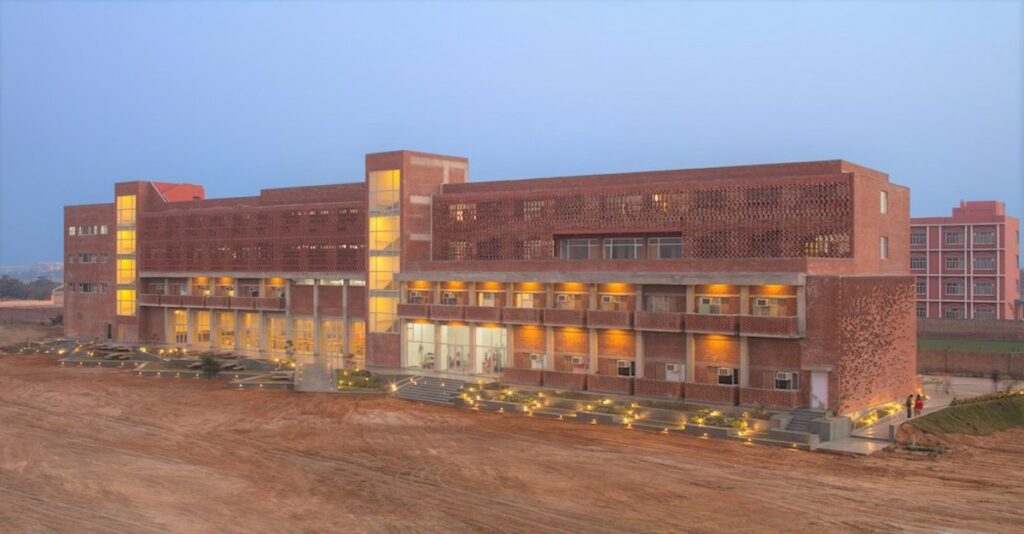
The eligibility criteria for engineering colleges in India typically include the following aspects:
Educational Qualification
- 10+2 Examination: Candidates must have passed the 12th grade or equivalent examination from a recognized board.
- Subjects: Generally, candidates need to have studied Physics, Chemistry, and Mathematics (PCM) in their 10+2. Some colleges may also consider subjects like Computer Science.
Minimum Marks
- General Category: Most colleges require at least 50% aggregate marks in the 10+2 examination.
- Reserved Categories: There may be a relaxation of 5% in aggregate marks for reserved categories such as SC/ST.
Entrance Exams
- JEE Main: For admission to various NITs, IIITs, and other government-funded technical institutes.
- JEE Advanced: For admission to IITs. Candidates need to qualify JEE Main and secure a top rank.
- BITSAT: For BITS Pilani and its other campuses.
- State-Level Exams: Each state may have its own entrance exams, such as MHT-CET (Maharashtra), KCET (Karnataka), and AP EAMCET (Andhra Pradesh).
- Other Exams: VITEEE, SRMJEEE, and other private university exams.
Age Limit
- General Age Limit: Typically, candidates should be under 25 years of age.
- Relaxation: There may be age relaxation for reserved categories.
Nationality
- Indian Citizens: Most colleges require candidates to be Indian citizens.
- Foreign Students: Some institutions may have separate admission criteria for foreign students.
Additional Criteria
- Counseling: Candidates must participate in counseling rounds if required by the college or university.
- Document Verification: Submission of all necessary documents including mark sheets, scorecards, and identity proof.
Special Categories
- Direct Admission: Some private colleges may offer direct admission based on 12th-grade marks or entrance test scores.
- Management Quota: Many private colleges have a management quota for direct admission, which may not require entrance exams but may involve higher fees.
Engineering Colleges in India: Fees and Scholarships
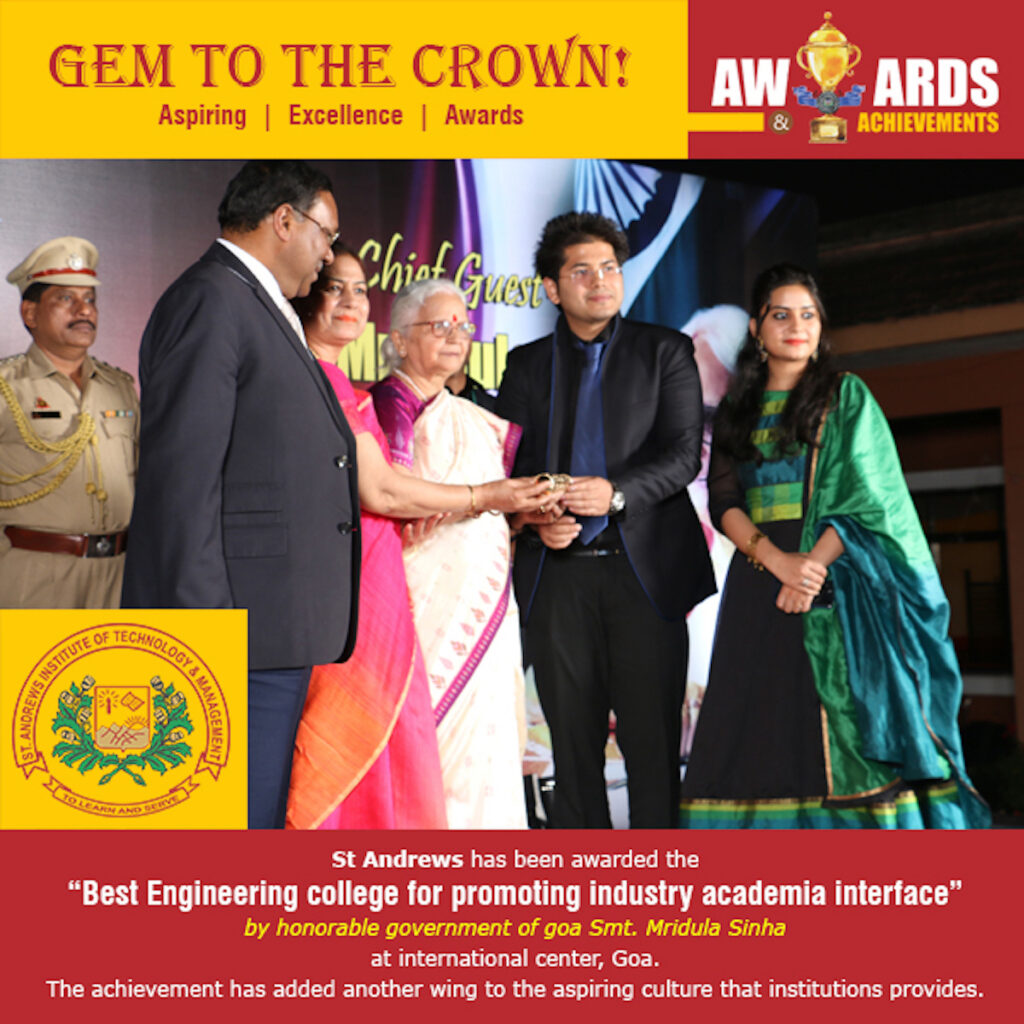
Here’s an overview:
Fees Structure
Government Engineering Colleges
Central Government Institutions (e.g., IITs, NITs)
- Tuition Fees: Typically range from ₹1,00,000 to ₹2,00,000 per annum.
- Other Fees: Additional fees for hostel, mess, and other amenities can range from ₹20,000 to ₹50,000.
State Government Institutions
- Tuition Fees: Generally between ₹50,000 and ₹1,00,000 per annum.
- Other Fees: Hostel and other charges may vary, usually between ₹10,000 and ₹30,000.
Private Engineering Colleges
Top Private Institutions (e.g., BITS Pilani, VIT Vellore)
- Tuition Fees: Usually between ₹2,00,000 and ₹4,00,000 per annum.
- Other Fees: Hostel and other fees can range from ₹50,000 to ₹1,50,000.
Other Private Colleges
- Tuition Fees: Typically range from ₹1,00,000 to ₹3,00,000 per annum.
- Other Fees: Additional fees for hostel and other amenities can range from ₹30,000 to ₹1,00,000.
Deemed-to-Be Universities
- Tuition Fees: Often between ₹1,50,000 and ₹3,00,000 per annum.
- Other Fees: Hostel and other charges vary widely, generally from ₹30,000 to ₹1,00,000.
Scholarships
Government Scholarships
National Scholarship Portal: Offers various scholarships for students from economically weaker sections, minorities, and SC/ST/OBC categories.
Central Sector Scheme of Scholarship: For meritorious students of higher education.
State Government Schemes: Different states have their own scholarship programs for students based on merit and economic background.
Institutional Scholarships
Merit-Based Scholarships: Awarded based on academic performance and entrance exam scores. For example, many top private institutions offer scholarships based on JEE Main/BITSAT scores.
Need-Based Scholarships: Provided to students based on their financial needs. Institutions like IITs and NITs offer financial aid for students from economically disadvantaged backgrounds.
Sports and Extracurricular Scholarships: Awarded to students who excel in sports or other extracurricular activities.
Private and Corporate Scholarships
Corporate Scholarships: Many companies offer scholarships to students pursuing engineering, often with the expectation of future employment with the company. Examples include TCS, Infosys, and Wipro.
NGO and Trust Scholarships: Various NGOs and trusts provide scholarships based on merit or need, such as the JN Tata Endowment Scholarship and the Shankar Foundation Scholarship.
Entrance Exam for Top Engineering Colleges

Here are key entrance exams for top engineering colleges in India:
JEE Main
For admission to NITs and private colleges; subjects: Physics, Chemistry, Mathematics; computer-based test.
JEE Advanced
For IITs; subjects: Physics, Chemistry, Mathematics; pen-and-paper test; requires JEE Main qualification.
BITSAT
For BITS Pilani and its campuses; subjects: Physics, Chemistry, Mathematics, English, Logical Reasoning; computer-based test.
VITEEE
For VIT University campuses; subjects: Physics, Chemistry, Mathematics; computer-based test.
MHT-CET
For engineering colleges in Maharashtra; subjects: Physics, Chemistry, Mathematics; pen-and-paper test.
JCECE
For engineering colleges in Jharkhand; subjects: Physics, Chemistry, Mathematics; pen-and-paper test.
KCET
For engineering colleges in Karnataka; subjects: Physics, Chemistry, Mathematics; pen-and-paper test.
UPSEE
For engineering colleges in Uttar Pradesh; subjects: Physics, Chemistry, Mathematics; pen-and-paper test.
COMEDK UGET
For engineering colleges in Karnataka; subjects: Physics, Chemistry, Mathematics; computer-based test.
Types of Engineering Colleges in India
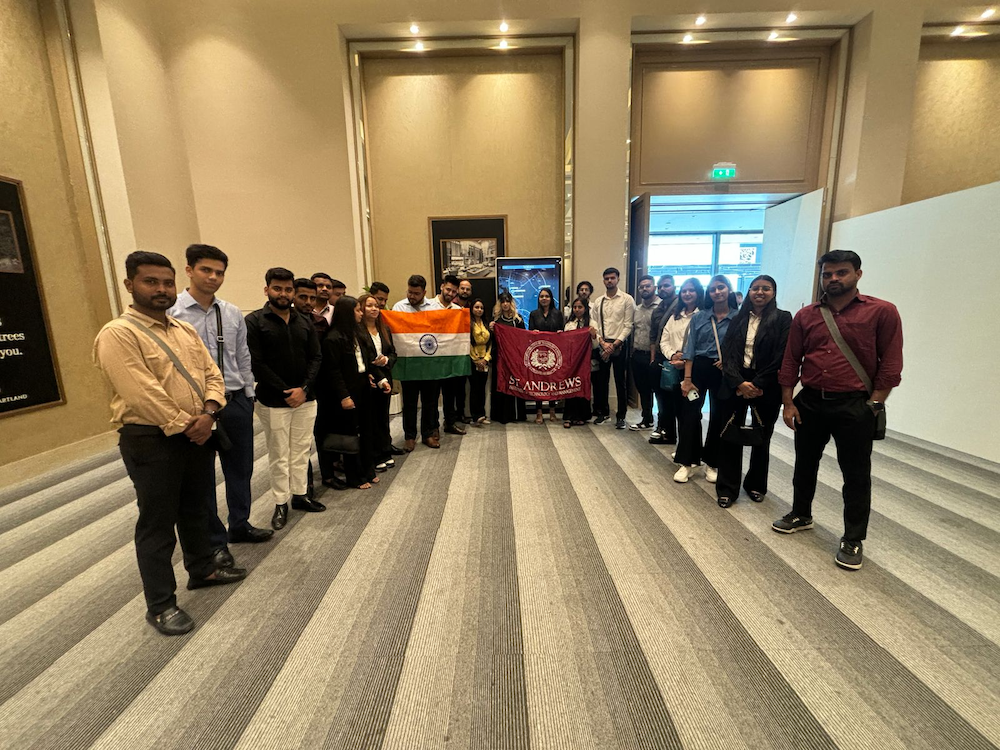
Here’s a breakdown:
Government Engineering Colleges
Central Government Institutions: These include prestigious institutes like the Indian Institutes of Technology (IITs) and National Institutes of Technology (NITs). They are funded and managed by the central government.
State Government Institutions: Engineering colleges funded and managed by state governments. Examples include Government College of Engineering, Pune, and Anna University, Chennai.
Private Engineering Colleges
Top Private Institutions: These include high-ranking private colleges with good infrastructure and faculty, such as BITS Pilani, VIT Vellore, and Shiv Nadar University.
Other Private Colleges: Numerous other private colleges offer a range of engineering programs, often with varying levels of infrastructure and faculty quality.
Deemed-to-Be Universities
Autonomous Institutions: These institutions have been granted the status of deemed universities and have the autonomy to design their own curriculum and conduct their own exams. Examples include Amrita Vishwa Vidyapeetham and O.P. Jindal Global University.
University Affiliated Colleges
Affiliated Colleges: These colleges are affiliated with a university and follow its curriculum and exam system. They may be government or private institutions. Examples include many engineering colleges under the affiliation of Delhi Technological University (DTU) or Jawaharlal Nehru Technological University (JNTU).
Autonomous Engineering Colleges
Self-Governing Institutions: These colleges have autonomy in their administrative and academic activities while being affiliated with a university. They design their own curriculum and conduct exams. Examples include the Indian Institute of Information Technology, Allahabad (IIIT-A).
International Collaboration Colleges
Collaborative Programs: Some engineering colleges have collaborations with international universities for joint programs, dual degrees, or exchange programs. Examples include some programs offered by private institutions with partnerships abroad.
Specialized Engineering Colleges
Institutes with Focused Programs: These colleges may focus on specific fields such as aerospace, marine, or software engineering. Examples include the Indian Institute of Space Science and Technology (IIST) and the Indian Maritime University (IMU).
Required Skillset for Top Engineering Colleges
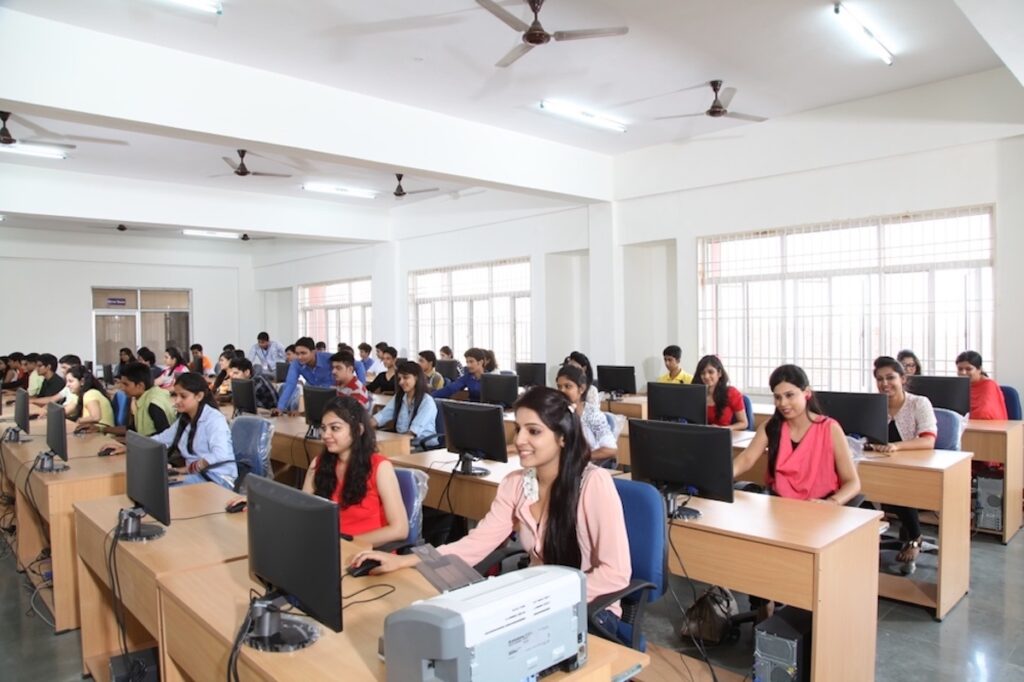
To excel in top engineering colleges, students typically need a diverse skill set, including:
Strong Analytical Skills
Ability to solve complex problems and think critically.
Mathematical Proficiency
Solid understanding of advanced mathematics and its applications.
Technical Aptitude
Familiarity with engineering principles, software tools, and technical concepts.
Programming Skills
Proficiency in programming languages like C, C++, Java, or Python.
Communication Skills
Effective written and verbal communication for presenting ideas and collaborating with peers.
Teamwork
Ability to work well in group settings and contribute to collaborative projects.
Time Management
Efficiently managing time and balancing multiple assignments and deadlines.
Curiosity and Innovation
A keen interest in learning and exploring new technologies and ideas.
Problem-Solving Abilities
Creativity in approaching and resolving engineering challenges.
Adaptability
Flexibility in adapting to new tools, technologies, and methodologies.
Top Specializations offered by Engineering Colleges in India
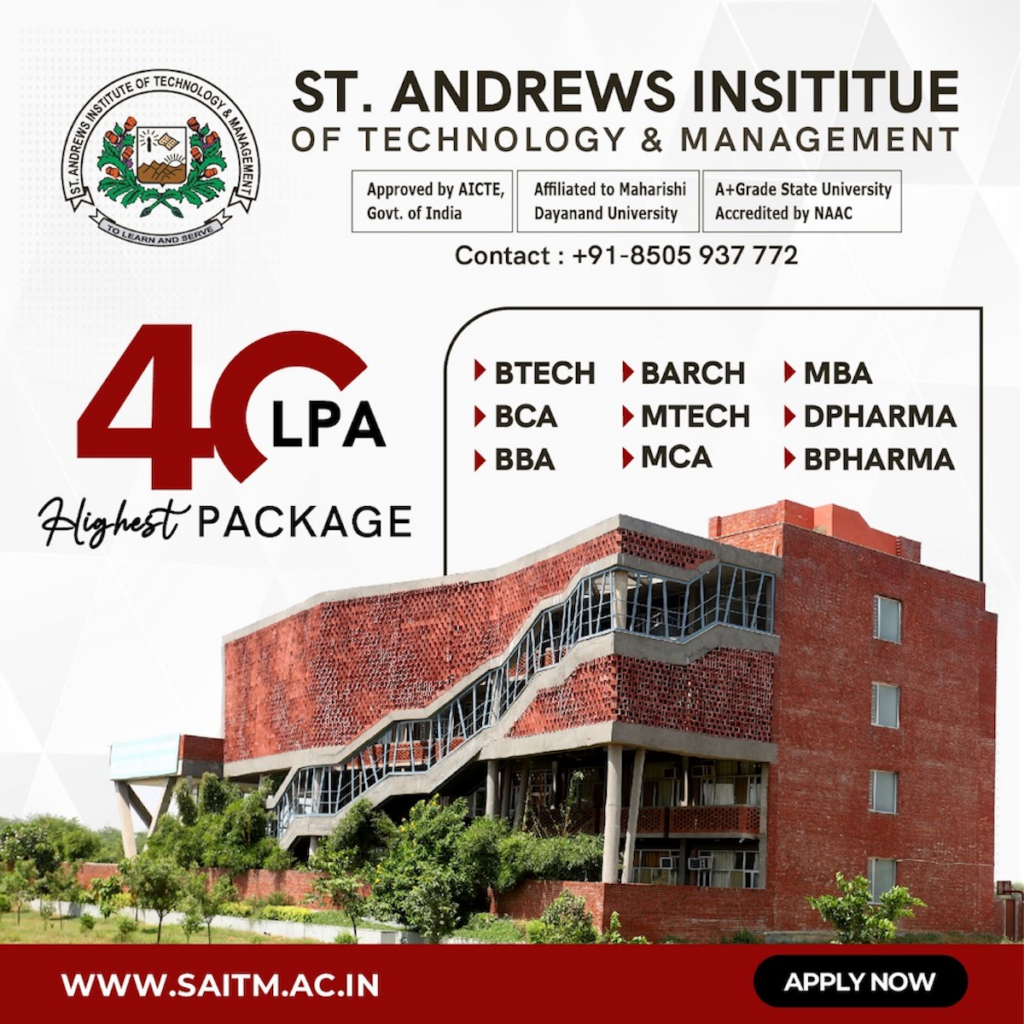
Here’s an in-depth look at some of the top engineering specializations offered by colleges in India, including key focus areas, subjects covered, and potential career paths:
Computer Science Engineering (CSE)
- Software Development: Creation, design, and maintenance of software applications. This field is central to the curriculum in top computer science engineering colleges, preparing students for roles in developing innovative software solutions.
- Algorithms and Data Structures: Fundamental concepts used to optimize performance and manage data.
- Artificial Intelligence (AI) and Machine Learning (ML): Building systems that can learn and make decisions.
- Cybersecurity: Protecting systems and data from cyber threats.
- Data Science and Big Data: Analyzing large datasets to extract meaningful insights.
- Career Paths: Software Developer, Data Scientist, AI Engineer, Cybersecurity Analyst, Systems Architect.
Electronics and Communication Engineering (ECE)
- Analog and Digital Electronics: Design and analysis of electronic circuits.
- Communication Systems: Transmission of information over various channels.
- Signal Processing: Techniques for analyzing and manipulating signals.
- Embedded Systems: Integration of hardware and software in specialized systems.
- Career Paths: Electronics Engineer, Communication Engineer, Embedded Systems Developer, Signal Processing Engineer.
Mechanical Engineering
- Thermodynamics: Study of heat transfer and energy conversion.
- Fluid Mechanics: Behavior of fluids in motion and at rest.
- Material Science: Properties and applications of materials.
- Manufacturing Processes: Techniques for producing mechanical components and systems.
- Robotics: Design and use of robots in various industries.
- Career Paths: Mechanical Engineer, Production Manager, Automotive Engineer, Robotics Engineer.
Civil Engineering
- Structural Engineering: Design and analysis of buildings and bridges.
- Geotechnical Engineering: Study of soil and rock mechanics.
- Environmental Engineering: Solutions for environmental challenges, such as waste management and pollution control.
- Transportation Engineering: Design and management of transportation systems.
- Career Paths: Civil Engineer, Structural Consultant, Construction Manager, Transportation Engineer.
Electrical Engineering
- Power Systems: Generation, transmission, and distribution of electrical power.
- Electrical Machines: Design and operation of motors, transformers, and generators.
- Control Systems: Systems for regulating machinery and processes.
- Renewable Energy: Development and integration of sustainable energy sources.
- Career Paths: Electrical Engineer, Power Systems Engineer, Control Systems Engineer, Renewable Energy Specialist.
Chemical Engineering
- Chemical Reactions: Principles and applications of chemical reactions in industrial processes.
- Process Design: Designing processes to manufacture chemicals and materials.
- Biochemical Engineering: Integration of biological processes in chemical production.
- Thermodynamics: Study of energy changes in chemical processes.
- Career Paths: Chemical Engineer, Process Engineer, Biochemical Engineer, Environmental Engineer.
Information Technology (IT)
- Software Development: Creation and maintenance of software solutions.
- Network Administration: Management and operation of computer networks.
- Database Management: Design and management of databases for storing and retrieving data.
- IT Infrastructure: Development and support of IT systems and services.
- Career Paths: IT Consultant, Network Administrator, Database Administrator, IT Project Manager.
Aerospace Engineering
- Aerodynamics: Study of the behavior of air around aircraft and spacecraft.
- Propulsion Systems: Design and analysis of engines and propulsion mechanisms.
- Aircraft Structures: Design and analysis of structures in aircraft and spacecraft.
- Space Missions: Planning and execution of missions in space exploration.
- Career Paths: Aerospace Engineer, Aircraft Designer, Space Mission Planner, Propulsion Engineer.
Biotechnology
- Genetic Engineering: Techniques for modifying genetic material.
- Bioinformatics: Application of computer technology to biological data.
- Molecular Biology: Study of biological molecules and their interactions.
- Bioprocessing: Design and operation of processes involving biological organisms.
- Career Paths: Biotechnologist, Research Scientist, Bioinformatics Specialist, Bioprocess Engineer.
Environmental Engineering
- Waste Management: Techniques for managing and disposing of waste materials.
- Water Resources: Management and treatment of water resources.
- Environmental Impact Assessment: Evaluating the impact of projects on the environment.
- Sustainable Development: Solutions for achieving sustainable growth and reducing environmental impact.
- Career Paths: Environmental Engineer, Sustainability Consultant, Water Resources Engineer, Environmental Analyst.
Structural Engineering
- Design and Analysis: Structural design and analysis of buildings, bridges, and other structures.
- Material Strength: Study of materials’ ability to withstand loads and forces.
- Earthquake Engineering: Design structures to withstand seismic activity.
- Construction Methods: Techniques and methods for constructing structures.
- Career Paths: Structural Engineer, Civil Designer, Construction Manager, Structural Consultant.
Automobile Engineering
- Vehicle Design: Design and development of vehicles and their systems.
- Automotive Systems: Study of various vehicle systems such as engines, transmission, and suspension.
- Fuel Technologies: Development of alternative fuels and propulsion systems.
- Manufacturing Processes: Techniques for manufacturing automotive components.
- Career Paths: Automotive Engineer, Vehicle Designer, Manufacturing Specialist, Fuel Technology Engineer.
Industrial Engineering
- Operations Research: Techniques for optimizing complex processes and systems.
- Supply Chain Management: Management of the flow of goods and services.
- Quality Control: Ensuring products and processes meet quality standards.
- Production Planning: Planning and managing production processes and resources.
- Career Paths: Industrial Engineer, Operations Manager, Supply Chain Analyst, Quality Control Specialist.
Mechatronics Engineering
- Integration of Mechanical Systems: Combining mechanical systems with electronics and computing.
- Robotics: Design and use of robots and automated systems.
- Control Systems: Systems for controlling mechanical and electronic devices.
- Automation: Development of automated systems for various applications.
- Career Paths: Mechatronics Engineer, Robotics Designer, Automation Engineer, Systems Integrator.
Marine Engineering
- Ship Design: Design and construction of ships and marine vessels.
- Marine Propulsion Systems: Design and operation of propulsion systems for marine vessels.
- Naval Architecture: Study of ship and marine structure design.
- Marine Systems: Development and management of systems used in marine environments.
- Career Paths: Marine Engineer, Ship Designer, Naval Architect, Marine Systems Analyst.
Top Government Engineering Colleges
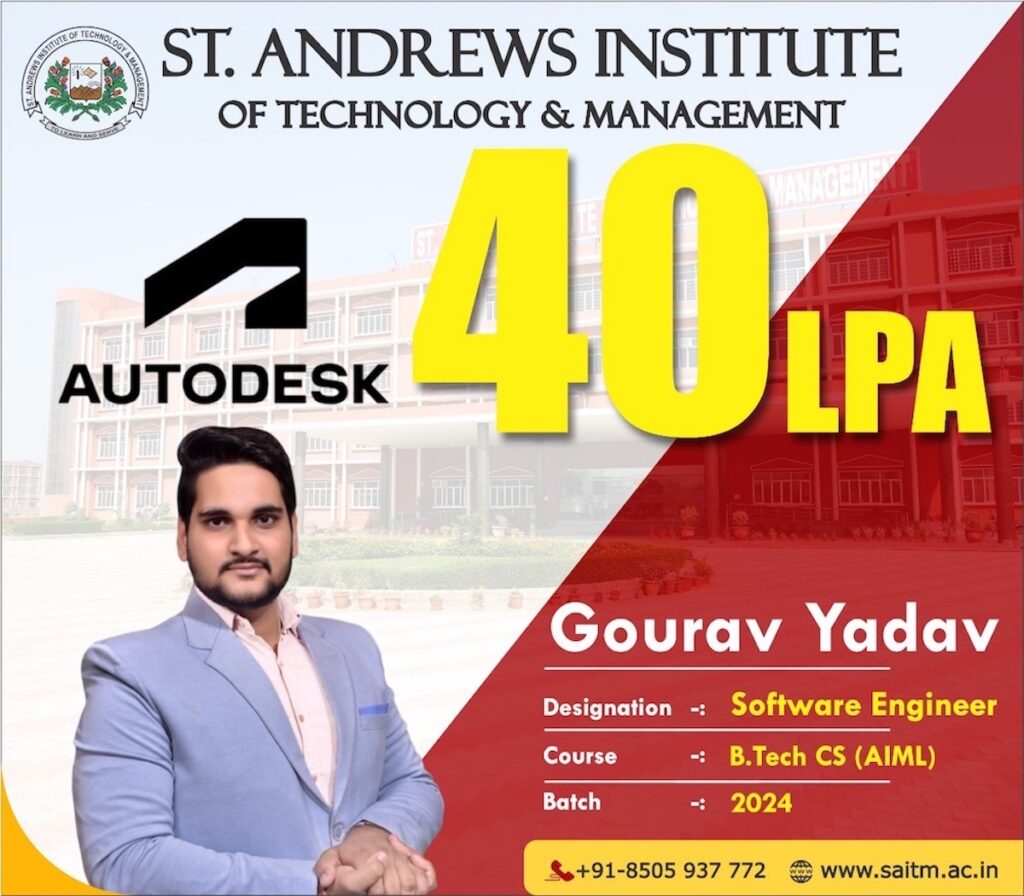
Here are some of the top government engineering colleges in India:
Indian Institute of Technology (IIT) Bombay
- Overview: One of the premier engineering institutions in India, known for its excellent academic programs and research opportunities.
- Key Highlights: Ranked among the top IITs in India, strong alumni network, and state-of-the-art facilities.
St. Andrews Institute of Technology and Management (SAITM)
- Overview: Although a private institution, SAITM offers quality education with a focus on practical skills and industry readiness.
- Key Highlights: Strong placement cell, modern infrastructure, and industry-aligned curriculum.
Indian Institute of Technology (IIT) Delhi
- Overview: IIT Delhi is renowned for its rigorous academic curriculum and contributions to research and innovation.
- Key Highlights: High placement records, cutting-edge research centers, and collaborations with global universities.
Indian Institute of Technology (IIT) Kanpur
- Overview: IIT Kanpur is known for its strong emphasis on technical education and research in engineering and technology.
- Key Highlights: Modern laboratories, strong research output, and a vibrant campus life.
National Institute of Technology (NIT) Trichy
- Overview: NIT Trichy is one of the top NITs in India, offering a wide range of engineering disciplines with excellent faculty and infrastructure.
- Key Highlights: Strong placement support, diverse student community, and well-equipped labs.
Delhi Technological University (DTU)
- Overview: Formerly known as Delhi College of Engineering, DTU is one of the top engineering colleges in India with a focus on innovation and entrepreneurship.
- Key Highlights: Strong industry connections, high placement rates, and state-of-the-art infrastructure.
Indian Institute of Technology (IIT) Kharagpur
- Overview: IIT Kharagpur is known for its wide array of engineering programs and a strong focus on research and development.
- Key Highlights: Large campus, extensive alumni network, and strong industry linkages.
Indian Institute of Technology (IIT) Madras
- Overview: IIT Madras is a leading engineering institution in India, known for its research initiatives and strong academic programs.
- Key Highlights: High placement records, active research environment, and international collaborations.
Indian Institute of Technology (IIT) Roorkee
- Overview: One of the oldest engineering institutions in India, IIT Roorkee offers a rich legacy of academic excellence.
- Key Highlights: Historical significance, strong research output, and modern facilities.
National Institute of Technology (NIT) Warangal
- Overview: NIT Warangal is known for its high academic standards and strong placement records in various engineering fields.
- Key Highlights: Diverse academic programs, well-equipped labs, and active student organizations.
Top Private Engineering Colleges
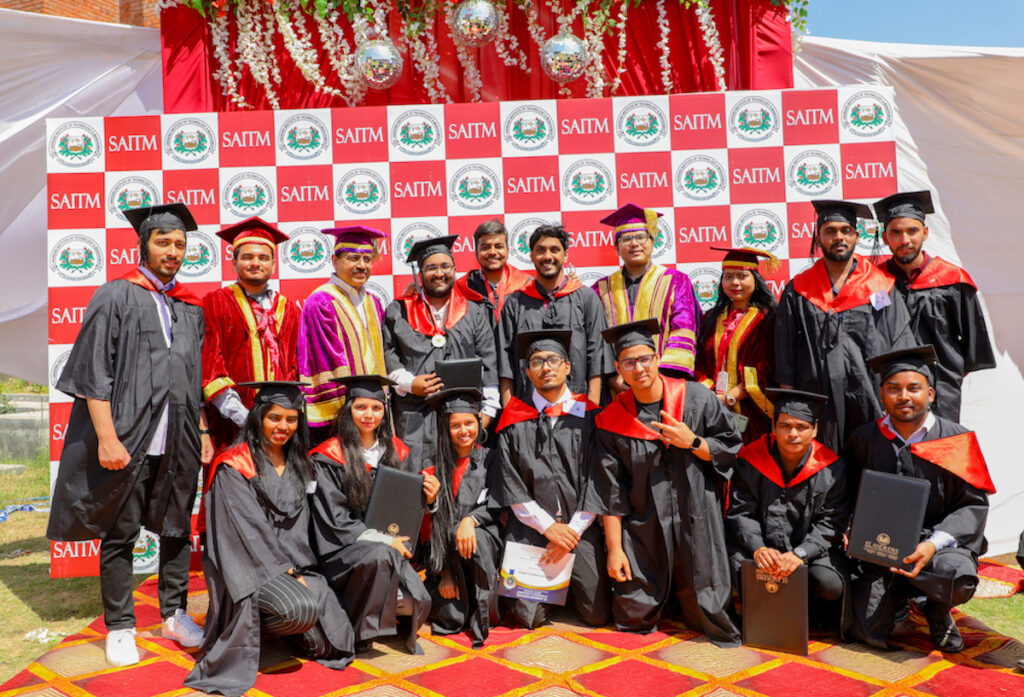
Here are some of the top private engineering colleges in India:
Birla Institute of Technology and Science (BITS), Pilani
- Overview: BITS Pilani is one of the most prestigious private engineering colleges in India, known for its excellent academic programs and innovative research. As a leading institution in India engineering landscape, BITS Pilani continues to set benchmarks in education and research excellence.
- Key Highlights: High placement rates, global alumni network, and strong industry connections.
St. Andrews Institute of Technology and Management (SAITM), Gurgaon
- Overview: SAITM is a reputed private engineering institution focused on delivering quality education with practical training.
- Key Highlights: Strong placement cell, modern infrastructure, and industry-aligned curriculum.
Vellore Institute of Technology Vellore, Tamil Nadu
- Overview: VIT Vellore is renowned for its world-class infrastructure and diverse engineering programs.
- Key Highlights: Excellent placement support, international collaborations, and a vibrant campus life.
Thapar Institute of Engineering and Technology, Patiala
- Overview: Thapar Institute is a leading private engineering college with a strong focus on research and innovation.
- Key Highlights: Extensive research opportunities, robust placement services, and industry-relevant curriculum.
R.V. College of Engineering (RVCE), Bangalore
- Overview: RVCE is a premier engineering college in Bangalore, known for its academic excellence and high placement records.
- Key Highlights: Strong alumni network, robust industry partnerships, and well-equipped laboratories.
PES University, Bangalore
- Overview: PES University is recognized for its engineering programs and emphasis on research and innovation.
- Key Highlights: High placement success, state-of-the-art infrastructure, and active research culture.
Sathyabama Institute of Science and Technology, Chennai
- Overview: Sathyabama Institute is a leading private engineering college offering a range of specialized engineering programs.
- Key Highlights: Modern research facilities, industry partnerships, and strong placement support.
Top Engineering Colleges in India : Location Wise
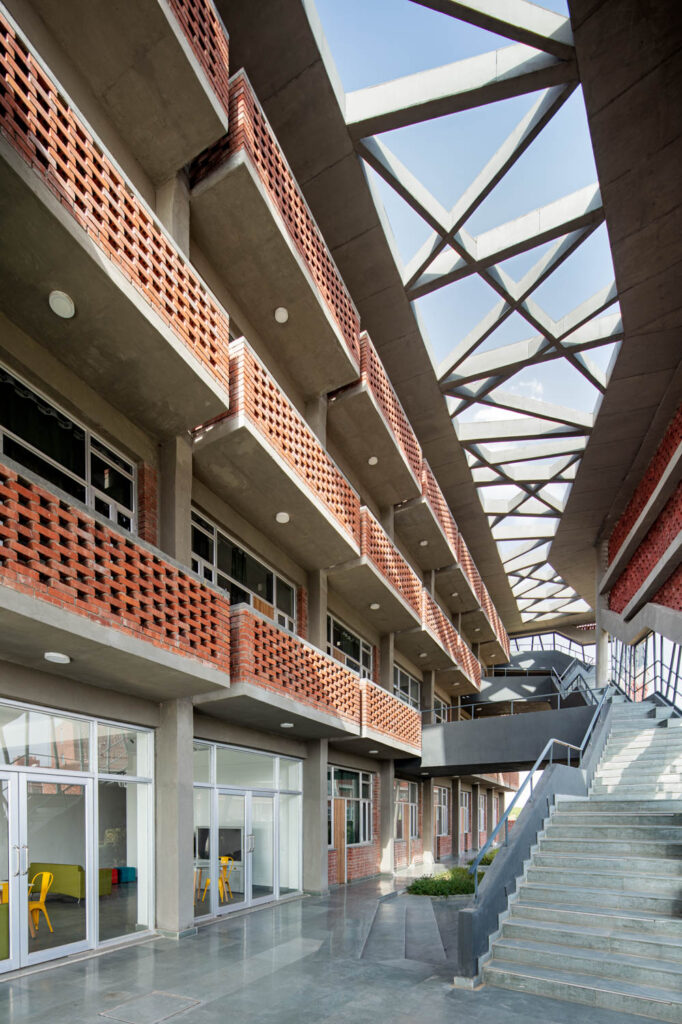
Here’s an updated list of top engineering colleges in India, categorized by their location:
North India
Delhi
Indian Institute of Technology (IIT) Delhi
Delhi Technological University (DTU)
St. Andrews Institute of Technology and Management (SAITM)
Punjab
Punjab Engineering College (PEC) Chandigarh
Dr. B.R. Ambedkar National Institute of Technology, Jalandhar
Uttar Pradesh
Indian Institute of Technology (IIT) Kanpur
Institute of Engineering and Technology (IET) Lucknow
Bundelkhand Institute of Engineering and Technology (BIET) Jhansi
Haryana
National Institute of Technology (NIT) Kurukshetra
Baba Mastnath University
West India
Maharashtra
College of Engineering, Pune Maharashtra
Defence Institute of Advanced Technology Pune, Maharashtra
Institute of Chemical Technology Mumbai, Maharashtra
Gujarat
Indian Institute of Technology (IIT) Gandhinagar
Nirma University
Sardar Vallabhbhai National Institute of Technology Surat, Gujarat
Rajasthan
Malaviya National Institute of Technology (MNIT) Jaipur
Birla Institute of Technology and Science (BITS) Pilani
Rajasthan Technical University (RTU) Kota
South India
Tamil Nadu
Indian Institute of Technology (IIT) Madras
National Institute of Technology (NIT) Tiruchirappalli
Anna University Chennai
Sri Sivasubramaniya Nadar College of Engineering (SSNCE)
Karnataka
Indian Institute of Science (IISc) Bangalore
National Institute of Technology (NIT) Surathkal
Sikkim Manipal Institute of Technology Manipal, Karnataka
BMS College of Engineering Bangalore
Andhra Pradesh
Indian Institute of Technology (IIT) Hyderabad
National Institute of Technology (NIT) Warangal
VIT University Vellore
JNTU Hyderabad
Telangana
Indian Institute of Technology (IIT) Hyderabad
International Institute of Information Technology (IIIT) Hyderabad
Osmania University Hyderabad
East India
West Bengal
Indian Institute of Technology (IIT) Kharagpur
Jadavpur University Kolkata
Bengal Engineering and Science University (BESU) Shibpur
Heritage Institute of Technology Kolkata
Odisha
National Institute of Technology (NIT) Rourkela
Kalinga Institute of Industrial Technology Bhubaneswar
Bihar
National Institute of Technology (NIT) Patna
Indian Institute of Technology (IIT) Patna
Central India
Madhya Pradesh
Maulana Azad National Institute of Technology (MANIT) Bhopal
Manipal Institute of Technology (MIT) Bhopal
Shri G.S. Institute of Technology and Science (SGSITS) Indore
Chhattisgarh
National Institute of Technology (NIT) Raipur
Shri Shankaracharya Technical Campus (SSTC) Bhilai
Career Scope After Engineering
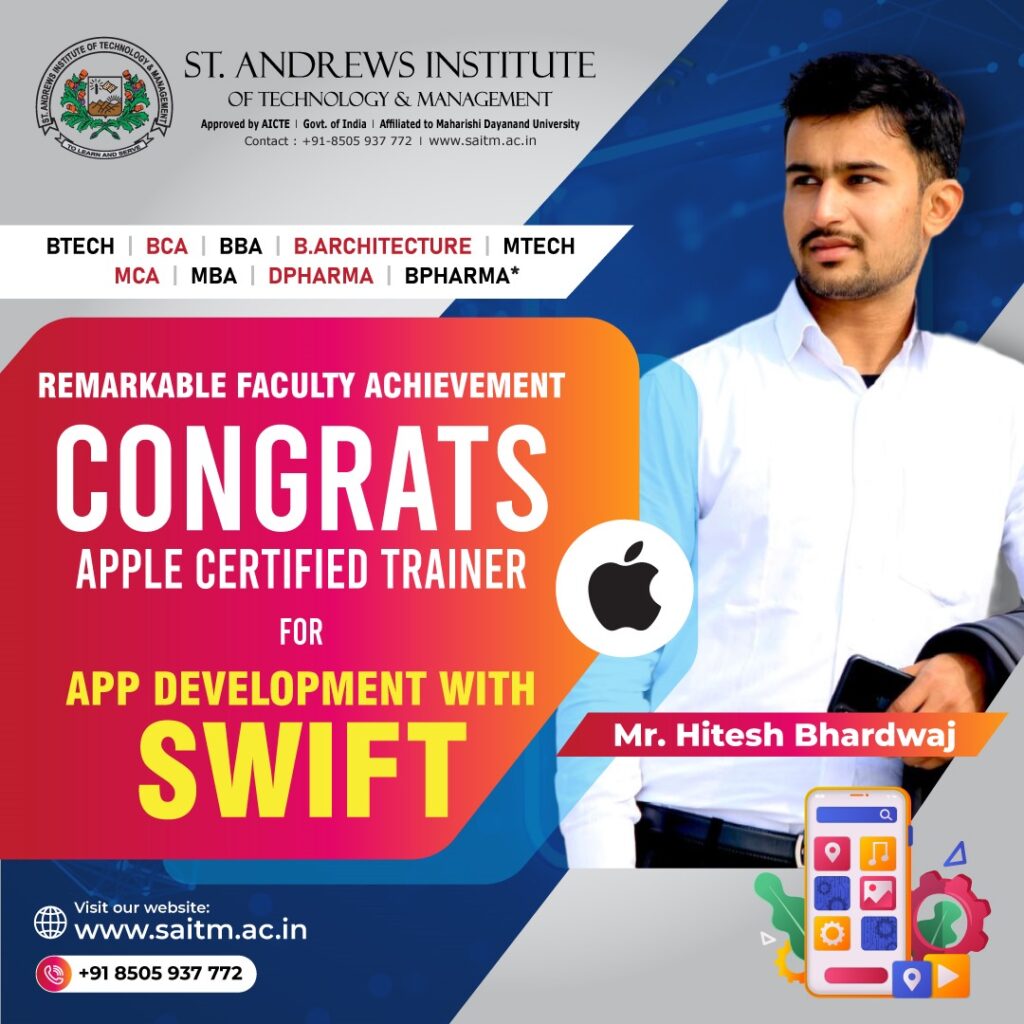
Here’s a detailed overview of potential career paths and opportunities across different domains:
Computer Science Engineering (CSE)
- Software Development: Designing and developing software applications.
- Data Science and Analytics: Analyzing large datasets to derive insights and support decision-making.
- Cybersecurity: Protecting information systems from cyber threats.
- Artificial Intelligence (AI) and Machine Learning (ML): Developing algorithms and models that enable machines to learn and make decisions.
- Career Paths: Software Developer, Data Scientist, AI Engineer, Cybersecurity Analyst, IT Consultant.
Electronics and Communication Engineering (ECE)
- Embedded Systems: Designing and developing embedded systems and microcontrollers.
- Communication Networks: Working with network design, implementation, and maintenance.
- Signal Processing: Analyzing and processing signals for various applications.
- Career Paths: Electronics Engineer, Communication Engineer, Embedded Systems Developer, Signal Processing Engineer.
Mechanical Engineering
- Manufacturing: Overseeing and improving manufacturing processes and production lines.
- Automotive Engineering: Designing and testing vehicles and automotive systems.
- Robotics: Developing and implementing robotic systems for automation.
- Career Paths: Mechanical Engineer, Manufacturing Engineer, Robotics Engineer, Automotive Engineer.
Civil Engineering
- Construction Management: Managing construction projects and ensuring compliance with regulations.
- Structural Engineering: Designing and analyzing structures such as bridges, buildings, and dams.
- Urban Planning: Developing plans for land use and infrastructure development.
- Career Paths: Civil Engineer, Structural Engineer, Construction Manager, Urban Planner.
Electrical Engineering
- Power Systems: Managing and optimizing electrical power generation and distribution.
- Control Systems: Designing systems for controlling and automating industrial processes.
- Renewable Energy: Working on projects involving solar, wind, and other renewable energy sources.
- Career Paths: Electrical Engineer, Power Systems Engineer, Control Systems Engineer, Renewable Energy Specialist.
Artificial Intelligence and Machine Learning
- AI Research: Developing new algorithms and models for AI applications.
- Machine Learning Engineering: Building and deploying machine learning models.
- Career Paths: AI Researcher, Machine Learning Engineer, AI Developer.
Biotechnology
- Biopharmaceuticals: Developing drugs and therapies using biological processes.
- Genetic Engineering: Modifying genetic material for research and applications.
- Career Paths: Biotechnologist, Research Scientist, Bioprocess Engineer.
Environmental Engineering
- Sustainability Consulting: Advising on sustainable practices and environmental impact.
- Waste Management: Developing systems for waste reduction and management.
- Career Paths: Environmental Engineer, Sustainability Consultant, Waste Management Specialist.
Management and Entrepreneurship
- Project Management: Overseeing engineering projects, managing teams, and ensuring timely completion.
- Consulting: Providing expertise and advice to organizations in various engineering fields.
- Entrepreneurship: Starting and managing your own engineering-related business or startup.
- Career Paths: Project Manager, Management Consultant, Entrepreneur.
Further Studies and Research
- Master’s Degree (M.Tech/M.S.): Specializing further in a particular field of engineering.
- MBA: Transitioning into management roles or business-oriented positions.
- Ph.D.: Engaging in advanced research and academia.
- Career Paths: Research Scientist, Professor, R&D Specialist.
Government and Public Sector
- Public Sector Jobs: Opportunities in government departments, public enterprises, and infrastructure projects.
- Defense Services: Engineering roles in defense research and development, and armed forces.
- Career Paths: Public Sector Engineer, Defense Engineer, Government Consultant.
Teaching and Academia
- Teaching Positions: Becoming a lecturer or professor at engineering colleges and universities.
- Academic Research: Conducting research and contributing to academic knowledge in engineering.
- Career Paths: Lecturer, Professor, Research Fellow.
Top Companies Hiring Engineering Graduates
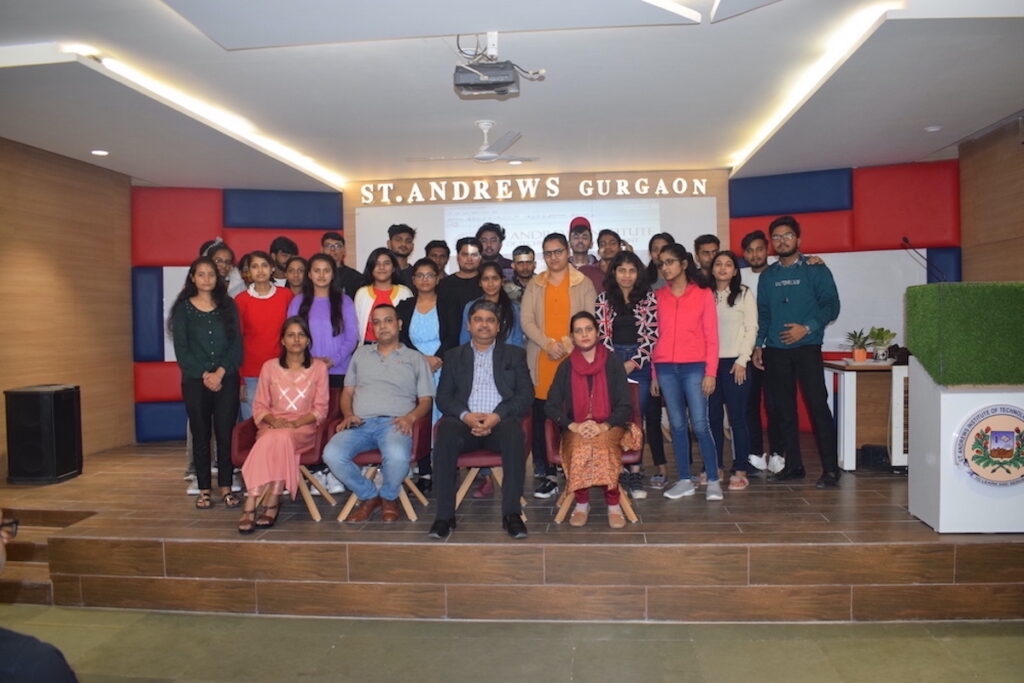
Here are some of the top companies known for hiring engineering graduates across various disciplines:
- Overview: A global leader in technology and innovation, Google offers opportunities in software engineering, data engineering, and more.
- Key Highlights: Renowned for its work culture, cutting-edge projects, and competitive compensation.
Microsoft
- Overview: A major player in technology, Microsoft recruits engineering graduates for roles in software development, cloud computing, and hardware engineering.
- Key Highlights: Strong focus on research and development, and numerous growth opportunities.
Amazon
- Overview: Known for its e-commerce and cloud computing services, Amazon hires engineering graduates for roles in software engineering, infrastructure, and machine learning.
- Key Highlights: Fast-paced work environment, innovation-driven projects, and extensive career growth.
IBM
- Overview: IBM provides diverse opportunities in fields such as artificial intelligence, cloud computing, and cybersecurity.
- Key Highlights: Focus on technology advancement, global reach, and a supportive work culture.
Intel
- Overview: A leading semiconductor company, Intel offers engineering roles in hardware design, manufacturing, and technology development.
- Key Highlights: Innovative work environment, emphasis on research, and strong career development.
Apple
- Overview: Known for its consumer electronics and software, Apple recruits engineering graduates for roles in hardware and software development.
- Key Highlights: High-impact projects, a culture of innovation, and attractive benefits.
Cisco Systems
- Overview: Cisco specializes in networking and cybersecurity solutions, offering engineering roles in network engineering, software development, and systems architecture.
- Key Highlights: Emphasis on technology solutions, career growth opportunities, and a collaborative work environment.
Samsung
- Overview: A major player in electronics and technology, Samsung hires engineering graduates for roles in product development, R&D, and manufacturing.
- Key Highlights: Innovative projects, global presence, and comprehensive career growth.
Qualcomm
- Overview: Qualcomm is a leading company in semiconductor and telecommunications, hiring engineering graduates for roles in chip design and mobile technology.
- Key Highlights: Cutting-edge technology, a strong focus on R&D, and dynamic work culture.
Tesla
- Overview: Known for its electric vehicles and renewable energy solutions, Tesla offers engineering roles in automotive design, energy systems, and software.
- Key Highlights: Innovative projects, a mission-driven culture, and rapid career advancement.
Placements and Salary Packages After Best Engineering Colleges
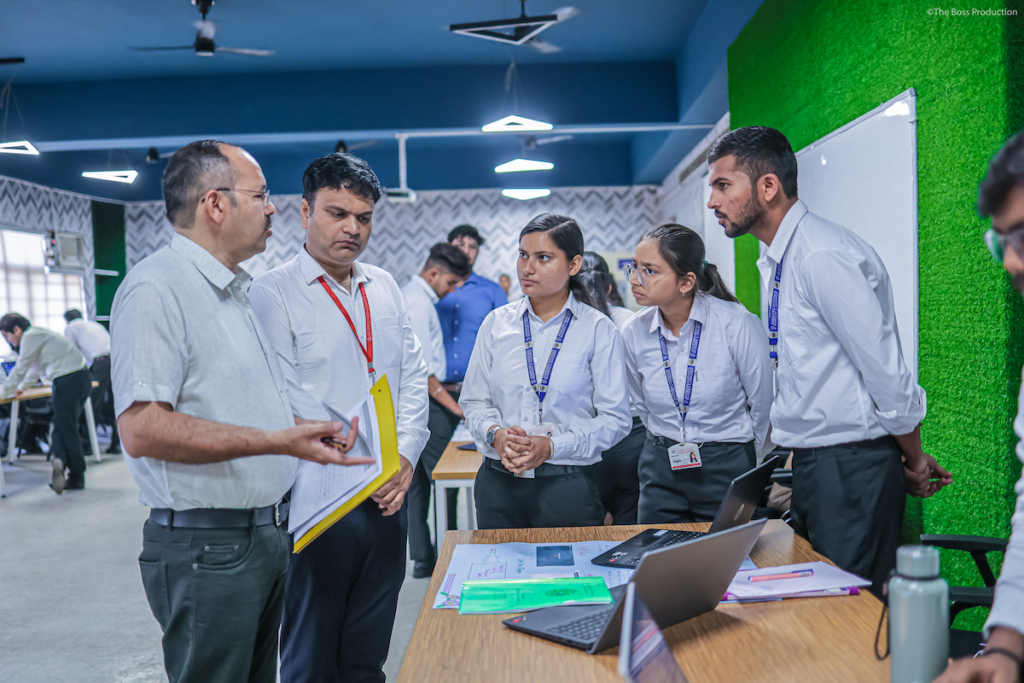
Here’s an overview of placements and salary packages for graduates from some of the best engineering colleges in India:
Indian Institutes of Technology (IITs)
Placements
- Top Companies: Google, Microsoft, Amazon, Facebook, Goldman Sachs, Intel.
- Roles: Software Engineer, Data Scientist, Research Scientist, Consultant.
- Internships: High-profile internships with global firms and research institutions.
Salary Packages
- Domestic: ₹12,00,000 to ₹30,00,000 per annum.
- International: ₹30,00,000 to ₹60,00,000 per annum or more.
- Average Package: ₹15,00,000 to ₹20,00,000 per annum.
National Institutes of Technology (NITs)
Placements
- Top Companies: Tata Consultancy Services (TCS), Infosys, IBM, Accenture, Oracle.
- Roles: Software Engineer, Systems Analyst, Project Manager.
- Internships: Typically with leading tech firms and industrial organizations.
Salary Packages:
- Domestic: ₹6,00,000 to ₹12,00,000 per annum.
- Average Package: ₹8,00,000 to ₹10,00,000 per annum.
St. Andrews Institute of Technology and Management (SAITM)
Placements
- Top Companies: Infosys, TCS, Wipro, Accenture, IBM.
- Roles: Software Engineer, IT Consultant, Systems Developer, Network Engineer.
- Internships: Often with prominent IT firms and local industry partners.
Salary Packages
- Domestic: ₹12,00,000 to ₹40,00,000 per annum.
- Average Package: ₹12,00,000 to ₹25,00,000 per annum.
Birla Institute of Technology and Science (BITS) Pilani
Placements:
- Top Companies: Google, Microsoft, Adobe, Qualcomm, Deloitte.
- Roles: Software Developer, Business Analyst, Engineering Consultant.
- Internships: High-quality internships with global tech firms and consulting companies.
Salary Packages
- Domestic: ₹8,00,000 to ₹15,00,000 per annum.
- International: ₹20,00,000 to ₹40,00,000 per annum.
- Average Package: ₹10,00,000 to ₹12,00,000 per annum.
VIT University
Placements
- Top Companies: Cognizant, Wipro, Infosys, Amazon, Capgemini.
- Roles: Software Engineer, IT Consultant, System Developer.
- Internships: Generally with major IT firms and startups.
Salary Packages
- Domestic: ₹4,00,000 to ₹8,00,000 per annum.
- Average Package: ₹6,00,000 to ₹7,00,000 per annum.
Delhi Technological University (DTU)
Placements
- Top Companies: Microsoft, Google, JP Morgan Chase, Oracle.
- Roles: Software Developer, Financial Analyst, Research Engineer.
- Internships: Competitive internships with major firms and research labs.
Salary Packages
- Domestic: ₹6,00,000 to ₹12,00,000 per annum.
- Average Package: ₹8,00,000 to ₹10,00,000 per annum.
Indian Institute of Information Technology (IIITs)
Placements
- Top Companies: Amazon, Microsoft, Facebook, Google.
- Roles: Software Engineer, Machine Learning Engineer, Data Analyst.
- Internships: Often with leading tech companies and startups.
Salary Packages
- Domestic: ₹7,00,000 to ₹15,00,000 per annum.
- Average Package: ₹9,00,000 to ₹11,00,000 per annum.
FAQs
Which is the No 1 engineering college in India?
The Indian Institute of Technology (IIT) Madras is widely acclaimed as the No. 1 engineering college in India. Renowned for its pioneering research, top-tier faculty, and state-of-the-art facilities, IIT Madras consistently leads in national rankings. It offers a diverse range of undergraduate, postgraduate, and doctoral programs across various engineering disciplines, including Engineering Science and Computer Science Engineering. The institute fosters a dynamic research environment, significantly contributing to technological advancements and innovation in India’s engineering sector.
Which are the top 10 colleges in Pune for engineering?
Pune is home to several top engineering colleges, with the College of Engineering, Pune (COEP) leading the list due to its historic legacy and academic excellence. MIT World Peace University (MIT-WPU) and Vishwakarma Institute of Technology (VIT) are also highly regarded for their strong academic programs and industry connections. Pune Institute of Computer Technology (PICT) is well-known for its focus on computer engineering. Other prominent institutions include Bharati Vidyapeeth Deemed University College of Engineering, Sinhgad College of Engineering, Dr. D.Y. Patil Institute of Technology, MIT Academy of Engineering (MITAOE), Army Institute of Technology (AIT), and Cummins College of Engineering for Women.
What is the best college for engineering?
The Indian Institute of Technology (IIT) Madras is often considered the best college for engineering in India. Known for its world-class faculty, cutting-edge research facilities, and innovative teaching methods, IIT Madras consistently ranks at the top in national and international rankings. The institute offers a wide range of undergraduate, postgraduate, and doctoral programs in various engineering disciplines. Its strong industry connections and extensive alumni network ensure excellent placement opportunities. IIT Madras is also a leader in fostering entrepreneurship and technological innovation, making it a top choice for aspiring engineers.
Which college is best for placement in Tamil Nadu?
Indian Institute of Technology (IIT) Madras is widely regarded as the best college for placements in Tamil Nadu. With its strong industry connections, top-tier faculty, and emphasis on research and innovation, IIT Madras attracts leading companies from India and abroad. The institute boasts an excellent placement record, with students securing high-paying jobs in sectors like technology, finance, consulting, and engineering. Companies such as Google, Microsoft, and Goldman Sachs frequently recruit from IIT Madras. The rigorous academic environment and comprehensive skill development programs further enhance students’ employability, making it the top choice for placements in Tamil Nadu.
Which are the top 20 engineering colleges in India?
India is home to some of the best engineering colleges, with the Indian Institutes of Technology (IITs) leading the list, particularly IIT Madras, IIT Delhi, IIT Bombay, IIT Kanpur, and IIT Kharagpur. Other prestigious institutions include Indian Institute of Science (IISc) Bangalore, IIT Roorkee, IIT Guwahati, and IIT Hyderabad. National Institutes of Technology (NITs) like NIT Trichy and NIT Surathkal are also highly regarded. BITS Pilani, Delhi Technological University (DTU), Vellore Institute of Technology (VIT), Anna University, and Jadavpur University round out the top 20, offering excellent education, research opportunities, and strong placement records.
How many engineering colleges are in India?
India is home to over 4,000 engineering colleges, offering a wide range of undergraduate and postgraduate programs across various disciplines. These institutions include prestigious Indian Institutes of Technology (IITs), National Institutes of Technology (NITs), state universities, private universities, and standalone engineering colleges. The All India Council for Technical Education (AICTE) oversees the accreditation and regulation of these institutions. The diversity of colleges ensures that students from different regions and backgrounds have access to engineering education. This vast network of engineering institutions plays a crucial role in producing skilled engineers who contribute to India’s technological and industrial growth.
Which are the top 10 BTech colleges in India?
India’s top BTech colleges are led by the Indian Institutes of Technology (IITs), with IIT Madras, IIT Delhi, and IIT Bombay at the forefront due to their academic excellence and strong placement records. National Institutes of Technology (NITs), particularly NIT Trichy and NIT Surathkal, are also highly esteemed. Delhi Technological University (DTU) and Vellore Institute of Technology (VIT) are renowned for their innovative programs and industry connections. Among private institutions, the St. Andrews Institute of Technology and Management (SAITM) stands out for its quality education and growing reputation. BITS Pilani and Anna University complete the list of top BTech colleges in India.
Which ranking is best for engineering?
When determining the best ranking for engineering colleges, the National Institutional Ranking Framework (NIRF) by the Indian government stands out as the most credible. NIRF ranks institutions based on various parameters, including teaching quality, research, graduation outcomes, and industry links. The rankings are updated annually and widely recognized by students, educators, and employers alike. For international perspectives, the QS World University Rankings and Times Higher Education (THE) are highly regarded, offering global comparisons. These rankings provide valuable insights into the quality of engineering courses at centrally funded technical institutes and help students make informed decisions.

